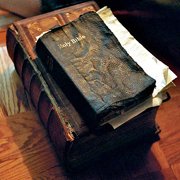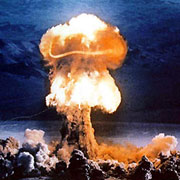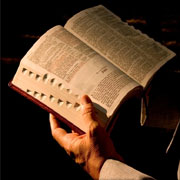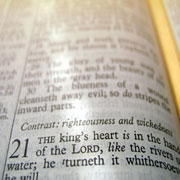

Custom Search
Are we Living in the Last Days...End Times? See Breaking News |
 |
| __________________________ |
 |
________________________ |
| ________________________ |
As You Study the Biblical Last Days in the News... Discover the Bible As Well |
 |
| ________________________ |
 |
| ________________________ |
 |
| ________________________ |
To Know God's Word Read Scripture |
 |
_______________________ |
To Read God's Word Your Reading Schedule |
 |
_______________________ |
 |
| _________________________ |
Thought Provoking Articles for Your Meditation |
 |
_______________________ |
A. The Advice of God to Man |
|
|---|---|
Psalm 1 The Two Ways |
|
Blessed is the Man…As an introduction to the whole Book of Psalms; Psalm 1 opens with a beatitude. It offers a choice, a way to understand happiness, life, and prosperity differently from the usual order of things. It is thoroughly God-centered; the way to happiness is to delight in the teachings of God. |
|
Psalm 2 God's Reign and His Anointed |
|
Why Do the Nations Conspire…Psalm 2 asks the question: Who rules the world? Who is in control? The answer is unequivocally "God reigns." God does not reign through absolute power, but through divine love. The "happy" person understands this. |
|
Psalm 3 God Helps Those Who Cannot Help Themselves |
|
Lord, How Many Are my Foes…being happy does not mean living without struggles. But the good news is that God rescues them from their afflictions. The psalmist knows that from the Lord comes deliverance. |
|
Psalm 4 A Prayer for Help |
|
Answer me When I Call to You…Those who belong to God know that everything else is relative - specifically, reputation and possessions. Holding to this fact results in safety…and a good night's sleep! |
|
Psalm 5 Lead Me, O Lord |
|
Lead me, O Lord, in Your Righteousness…Threatened by violent schemes and the victim of lies and deceit, the psalmist appeals to God and to God's ways of dealing with them. The Lord will bless the righteous and surround them with His shield. |
|
Psalm 6 How Long, O Lord? |
|
How Long, O Lord, How Long? In this cry for help, foes are not the problem, God is. It appears that some physical illness threatens the life of the psalmist. But if God's silence is the problem, God is also the solution. The only hope rests in God. |
|
Psalm 7 The Lord is Righteous |
|
O Righteous God, Who Searches Minds and Hearts…The psalmist affirms his innocence (and righteous behavior). He prays that God will deal righteously with him as well as his enemies. T hen he will give thanks to the Lord for his righteousness. |
|
Psalm 8 A Song of Praise |
|
O Lord, How Majestic is Your Name…The psalmist affirms the cosmic sovereignty of God and the exalted status of human creatures. "When I consider your heavens…what is man? You crowned him with glory." |
|
Psalm 9-10 Do Not Forget the Oppressed |
|
The Lord is a Refuge for the Oppressed…Together Psalms 9 and 10 make a single acrostic poem whereby every other line begins with a successive letter of the Hebrew alphabet. Prayed as one of the poor and helpless, the psalms anticipate and depend on the rule of God. "The Lord is king forever and ever". |
|
Psalm 11 The Upright Will See God |
|
In the Lord I Take Refuge…This is a psalm of trust wherein the psalmist is given a chance to make his case, perhaps to confront his opponents. He expresses his confidence in God's sovereignty and entrusts his destiny to God. |
|
Psalm 12 I Will Now Arise |
|
Help Lord, For the Godly Are No More…The psalm begins with "Help." Though the wicked boast in their own strength, the psalmist knows God is "with us." God will rise up to help the poor and the needy. |
|
Psalm 13 Trusting in God's Steadfast Love |
|
I Trust in Your Unfailing Love…This psalm is a short and simple prayer that asks "how long?" four times. Nonetheless, the psalmist is confident that God will respond and gives reasons why He should. |
|
Psalm 14 Evildoers Do No Good |
|
There is no One Who Does Good…Fools deny God and do no good. God will help the victimized people and this psalm anticipates and celebrates the deliverance to come. |
|
Psalm 15 Those Whose Walk is Blameless |
|
Who May Live on Your Holy Hill? The answer is an explication of the conduct of those who would enter the Temple for worship. These lives are completely dependent and orientated towards God. |
|
Psalm 16 Keeping the Lord Before Me |
|
Keep Me Safe; O Lord…This psalm expresses confidence and trust. The challenge is to keep the Lord before us and the reward is the experience of God's presence. |
|
Psalm 17 Seeing the Likeness of the Lord |
|
When I Awake, I Will be Satisfied With Seeing Your Likeness…This petition for help also contains a protestation of innocence. The psalmist once again humbly trusts God's willingness to save and His righteousness. |
|
Psalm 18 God's Steadfast Love |
|
The Lord is My Rock, My Fortress and My Deliverer…At 50 verses; this is one of the longest psalms in the Book of Psalms. It is virtually identical to 2 Sam 22. This is a royal psalm, a celebration of God's deliverance of the king, possibly from some dire threat. |
|
Psalm 19 The Importance of Torah |
|
The Heavens Declare the Glory of God…The first half of this psalm deals with creation; the second half deals with Torah, or God's law. It affirms that God's love is the basic reality that drives the universe. |
|
Psalm 20 Trusting in the Name of the Lord |
|
May the Name of the God of Jacob Protect You…Because this psalm mentions God's anointed; it is thought to be a royal psalm. It is a prayer for the king and the nation, yet the primary actor is God. Ultimately, it is God who will save the people. |
|
Psalm 21 The King Trusts in the Lord |
|
O Lord, the King Rejoices…The beginning of the psalm celebrates that the king's wishes have been fulfilled. And the king is ever mindful that he lives in dependence upon God and his loving purpose. |
|
Psalm 22 My God, Why Have You Forsaken Me? |
|
I Cry Out by Day, But You do Not Answer…The psalm alternates between complaint and confidence. Though the psalmist feels forsaken, he nonetheless turns to God as "my God." These haunting words were forever immortalized in Jesus' lament from the cross. |
|
Psalm 23 Safe in the Lord |
|
The Lord is My Shepherd, I Shall Not Want…Though frequently read at funerals, this psalm also stands to edify life. All aspects of life are grounded in the provision and reality of God's reign. We are to live humbly and gratefully as God's children. |
|
Psalm 24 Everything is the Lord's |
|
The Earth is the Lord's, and Everything in it…For those who see the earth as the sphere of God's reign, every aspect of life will be grounded in dependence upon God, and in the desire to exemplify God's loving purposes. |
|
Psalm 25 Show Me Your Ways, O Lord |
|
In You I Trust, O My God…This is another acrostic poem. The psalmist prays to offer his life to God, to seek God's ways, and to find security and refuge in God. There is openness to God's instruction and a confidence in discerning His will. |
|
Psalm 26 Let Justice Be Done |
|
Vindicate Me, O Lord, For I Am Blameless…Not only is this a call for justice, but also a call for God to test him and determine his innocence. Perhaps the psalmist has been wrongfully accused and hence stands before God, appealing for his justice. |
|
Psalm 27 Seeking the Face of the Lord |
|
The Lord is My Light and My Salvation…Whom Shall I Fear? The beginning of the psalm is a remarkable profession of faith in God. The opposite of faith, however, is fear. Despite threatening forces, the psalmist proclaims, "My heart will not fear." |
|
Psalm 28 The Lord is My Strength |
|
To You I Call, O Lord My Rock…This psalm begins with a prayer for help and an affirmation that God will deal justly with the wicked. Its conclusion invokes salvation and blessing for all God's people. |
|
Psalm 29 Glory and Strength to the Lord |
|
Worship the Lord in the Splendor of His Holiness…Perhaps one of the oldest psalms; it attributes all power to God. Even cosmic manifestations proclaim God's reign. The voice of the Lord is like thunder and shakes the desert. And all cry, "Glory." |
|
Psalm 30 A Hymn of Praise and Thanksgiving |
|
I Called to You For Help and You Healed Me…This is thought to be a psalm for the dedication of the temple. Some have attributed this psalm to the time of the Maccabees (165BC) and used in the celebration of Hanukkah. It is a prayer of thanksgiving for an unspecified deliverance. |
|
Psalm 31 My Life is in Your Hands |
|
My Times Are in Your Hands…Deliver Me…Despite a chaotic life; the psalmist begins and ends with affirmations about trusting God. It is up to God to set things right in his life. The psalmist's life and future are entrusted to God, and God will deliver him because it is His nature to do so. |
|
Psalm 32 Forgive My Sins |
|
Blessed is the Man Whose Sin the Lord Does Not Count Against Him…Though there is no actual confession of sin, this psalmist has experienced forgiveness. He begins with two beatitudes, highlights God's forgiving nature, and accepts God's grace. |
|
Psalm 33 God's Unfailing Love |
|
By the Word of the Lord Were the Heavens Made…This is a psalm of praise that affirms God's sovereignty over all. God spoke and it came to pass and God watches all that He has created. The psalm ends with another affirmation of God's power and steadfast love. |
|
Psalm 34 I Will Teach You |
|
Come My Children, Listen to Me; I Will Teach You…Another acrostic poem, psalm 34 is associated with wisdom literature in that it addresses "children" for the purpose of teaching them. The goal of the teaching is to fear the Lord and to impart "life". |
|
Psalm 35 Who is Like the Lord? |
|
My Whole Being Will Exclaim, "Who is Like You, O Lord?" Generally classified as an individual lament, the psalm is very disjointed...a possible reflection of the psalmist's life. As a resource for sufferers, this psalm stands as both a prayer for help and an affirmation of God's goodness. |
|
Psalm 36 In Your Light We See Light |
|
For With You is the Fountain of Life…Since God is the giver of life; He will also sustain that life. Life is not earned, but is a gift from God. Regardless of what is going on around us, God's love reaches to the heavens. |
|
Psalm 37 The Meek Will Inherit the Land |
|
Dwell in the land and enjoy safe pasture…Classified as a wisdom psalm, it addresses the seeming prosperity of the wicked. It affirms God's rule and concedes that sometimes the wicked appear to prosper…in the short term…but eventually they shall be cut off and the righteous shall inherit. |
|
Psalm 38 There is No Health in My Body |
|
My Bones Have No Soundness Because of My Sin…An individual lament, this psalm might have been sung by a sick person as a prayer for help. The sickness is perhaps a result of the psalmist's sinfulness. It concludes with an affirmation of trust in God. |
|
Psalm 39 My Hope is in You |
|
Hear My Prayer, O Lord, Listen to My Cry For Help…The lament is less specific than the previous psalm. This one addresses the universal problem of humanness. Yet again, the psalmist alternates between hope and despair. |
|
Psalm 40 I Desire to Do Your Will |
|
Your Law is Within My Heart…This psalm appears to have two distinct parts. The first is a song of thanksgiving; the second is another lament. It is as though a past deliverance is remembered in the quest for help in a new situation. |
|
Psalm 41 Blessed is the One who has Concern for the Poor |
|
The Lord Delivers Him in Times of Trouble…At the center of this psalm is a prayer for help. It is not known whether this is a current situation or a remembrance of some past need. The psalm ends with an expressed need for deliverance. |
|
B. The Advice of God to Israel |
|
Psalm 42-43 Hope in God |
|
Why Are You Downcast, O My Soul…Put Your Hope in God…Psalms 42 and 43 is a unit. The psalmist seems to be exiled from the Temple, which might put the date as a post-exilic psalm. Nonetheless, the verses speak generally to the issues of danger, hope, and trust. |
|
Psalm 44 My King and My God |
|
In God We Make our Boast All Day Long…This psalm might be the first communal lament in the Psalms. It again might be dated during the exile. Another option is that the speaker might be the king speaking for the whole community during a time of crisis. In it, the people of God are threatened, and it ends with a petition. |
|
Psalm 45 In Your Majesty Ride Forth Victoriously |
|
The Nations Will Praise You Forever and Ever…This psalm is essentially a song of praise. Some think it might have been a wedding song or a love song. Perhaps it was used at royal weddings. It demonstrates how intimately God was involved in the life of the king. |
|
Psalm 46 God is Our Refuge and Strength |
|
God is Our Refuge and Strength, an Ever Present Help in Trouble…After this psalms remarkable beginning, the writer shifts to God's city and God's activity on its behalf. Mostly, this is another affirmation of faith in God, and is considered to be a psalm of trust and confidence. |
|
Psalm 47 King Over All the Earth |
|
How awesome is the Lord Most High, the Great King Over all the Earth…Perhaps this was used in a liturgical procession celebrating the kingship of God. It invites everyone to acknowledge that ultimately God rules the world and everything in it. |
|
Psalm 48 How Great is the Lord |
|
Great is the Lord, and Most Worthy of Praise…Following psalm 47 on God's universal sovereignty, Psalm 48 locates God in a specific place, namely Mount Zion. This is a celebration of God's greatness and steadfast love, and His enduring presence. |
|
Psalm 49 God Will Redeem My Life |
|
God Will Redeem My Life From the Grave…This is another wisdom psalm that professes faith in God. Ultimately, God determines human destiny and rules the world. It ends with a warning to a man who has riches without understanding. He is like the beasts that perish. |
|
Psalm 50 God Himself is Judge |
|
The Heavens Proclaim His Righteousness, for God Himself is Judge…This might have been used in some sort of covenant renewal ceremony, or to address the issue of people in general in relation to God. Though it speaks of sacrifice, people are urged to live lives consistent with their beliefs. |
|
Psalm 51 Have Mercy on Me, O Lord |
|
Wash Away All My Iniquity and Cleanse Me From My Sin…This is a complaint, again involving the psalmist's sin. The reference to David's relationship to Bathsheba in the introduction sets the scene, however, this is more about God than about sin. The psalmist petitions God to forgive and re-create. |
|
Psalm 52 Trusting in God's Unfailing Love |
|
I Will Praise You Forever For What You Have Done…This psalm deals with the temptation to live for the moment…even at the expense of another. The wicked will fall and the righteous will be like an olive tree, flourishing in the house of God. |
|
Psalm 53 No One Does Good |
|
The Fool says in His Heart, "There is No God"…This psalm is virtually identical to Psalm 14. Both anticipate God's judgment on the evildoers. |
|
Psalm 54 Surely, God is my Help |
|
The Lord is the One Who Sustains Me…This is another prayer for help…with a happy ending. It ends with a thanksgiving for deliverance that has already occurred. |
|
Psalm 55 Cast Your Cares On the Lord |
|
He Will Sustain you; he Will Never Let the Righteous Fall…This psalm is very disjointed, leading some to think several psalms might have been combined. Or it might again reflect the chaotic life of the psalmist who is in extreme danger. |
|
Psalm 56 In God I Trust; I Will Not Be Afraid |
|
What Can Mortal Man do to Me? This psalm again alternates between praise and lament. Perhaps the psalmist found himself being persecuted, and turning his life over to God restored his faith. |
|
Psalm 57 Let Your Glory Be Over All the Earth |
|
Be Exalted, O God, Above the Heavens…This is another lament with heavy overtones of trust. God's love outweighs any evidence to the contrary. |
|
Psalm 58 God Judges the Earth |
|
Surely the Righteous Still Are Rewarded…This psalm begins by addressing the evildoers and ends with a prayer for justice. It affirms that, ultimately, God reigns over the world and His purposes will prevail. |
|
Psalm 59 You are My Fortress |
|
In the Morning I will Sing of Your Love…Like many other psalms, this one is a complaint, ending with praise. Regardless of the tenacity of the oppressors, the psalmist is just as persistent living in dependence upon God. |
|
Psalm 60 The Help of Man is Worthless |
|
With God We Will Gain the Victory…This psalm names the "enemies" outright…Edom, Philistia. But the real problem is God. The psalmist prays that God will come to their aid and knows that only then will they prevail. |
|
Psalm 61 You are my Refuge |
|
Lead Me to the Rock That is Higher Than I…Although this is another individual lament, this psalm proclaims an existing relationship with God. God's presence and safety are part of the psalmist's experience. |
|
Psalm 62 Rest in God Alone |
|
He Alone is My Rock and my Salvation…This psalm is an avowal of trust. Whatever the affliction or need, it is rooted in trust, not complaint. It is a confession of faith. |
|
Psalm 63 Your Love is Better Than Life |
|
Your Right Hand Upholds Me…A song of praise or thanksgiving, this psalmist seeks the presence of God. He knows that his life depends on God. Whatever the complaint, this psalmist rests comfortably in that fact. |
|
Psalm 64 Proclaim the Works of God |
|
They Will Proclaim the Works of God…This is a classic lament poem. It begins with the petition for help, the complaint, including a description of the enemies, and ends with affirmations of trust and praise. |
|
Psalm 65 You Enrich the Land Abundantly |
|
Your Carts Overflow With Abundance…This psalm has possibly been associated with the autumn harvest. Abundant rains have yielded plentiful results. The psalm gives reasons why God should be praised. |
|
Psalm 66 He Has Preserved Our Lives |
|
You Brought Us to a Place of Abundance…Psalm 65 claimed God reigned over all the earth, and Psalm 66 affirms the whole earth should praise God. A communal song of thanksgiving, this psalm asserts that God truly does rule over all. |
|
Psalm 67 That Your Ways May Be Known on Earth |
|
May God be Gracious to Us…and Make His Face Shine Upon Us…This is perhaps another communal thanksgiving or a commemoration of a harvest festival. God's sovereignty is again the focus. |
|
Psalm 68 A God Who Saves |
|
God Sets the Lonely in Families…. psalm 68 proclaims the reign and victory of God. |
|
Psalm 69 Shame Covers My Face |
|
My Guilt is Not Hidden From You…. This psalm is very similar to psalm 22. It is a lengthy lament whose circumstances are unknown. Like psalm 22, it ends with a promise to praise, an affirmation of trust in God despite the unbearable suffering. |
|
Psalm 70 Hurry, Lord! |
|
Hasten, O God, to Save Me…This psalm is very similar to Ps 40:13-17. It embraces the harried sufferer who entrusts his life and future to God. |
|
Psalm 71 You Have Been My Hope |
|
But as For Me, I Will Always Have Hope…This psalm is a typical lament type. It follows the petition, complaint, trust, and praise sequence…three times. This is to suggest the psalmist maintains persistent hope and faith. |
|
Psalm 72 Endow the King With Your Justice |
|
Endow…the Royal Son With Your Righteousness…This psalm is a prayer for the king and may have been used in enthronement ceremonies. It does, of course, recognize that the final authority and power rest with God. |
|
C. The Santuary and the Law |
|
Psalm 73 I Am With You |
|
I Am Always With You; You Hold Me by My Right Hand…This psalm is similar to psalms 1 and 2. The wicked are very present, but in the midst of this threat comes the assurance of God's presence and care. Goodness and happiness are derived from living God-centered lives. |
|
Psalm 74 Remember the People |
|
Do Not Forget the Lives of Your Afflicted People Forever…Psalm 74 is a communal lament, similar to the individual lament of psalm 73. The wicked seem to be prospering; the psalmist ends with a petition for God to act on behalf of His afflicted people. |
|
Psalm 75 Boast no More |
|
No One From the East or West Can Exalt a Man…The righteous are dependent upon God. The wicked are not. This psalm describes the outcomes of both groups. Ultimately, of course, God is sovereign, savior, and cosmic creator. |
|
Psalm 76 Resplendent With Light |
|
In Judah God is Known…This is considered a Zion song. Zion is God's dwelling place and the site of His victory. This is an invitation to its residents to live under God's sovereignty and statutes. |
|
Psalm 77 I Sought the Lord |
|
I Will Remember the Deeds of the Lord…There are two main sections to this psalm. The first half follows the typical lament form, but the second half does a complete turnaround. The psalm goes from despair to praise without any segue, again illustrating God's sovereignty regardless of present circumstances. |
|
Psalm 78 Trust in God |
|
I Will Utter Hidden Things, Things From of Old…This is an example of an historical psalm. It's not history in the sense of dates, places, and times. But it reworks and retells Israel's history in order to teach and to inspire hope and obedience in the hearts of its hearers. |
|
Psalm 79 Objects of Reproach |
|
Why Should the Nations Say, "Where is Their God?" This psalm recounts the painful taunts of the enemies following some national disaster. God seems so silent. Nonetheless, the psalmist ends with an affirmation of praise. They never lose hope. |
|
Psalm 80 Restore Us |
|
Make Your Face Shine Upon Us, That We May be Saved…Amid some horrible situation the psalmist affirms that God is reigning and He is trustworthy. The people expect God to rescue and restore them regardless of their present circumstances. |
|
Psalm 81 If They Would Only Listen |
|
Hear, O My People, and I Will Warn You - if You Would But Listen…This is more like a sermon and it might have been preached on festival days. It is a hopeful exhortation that someday the people will listen to God's word and their suffering will come to an end. |
|
Psalm 82 Rescue the Weak and Needy |
|
Defend the Cause of the Weak and Fatherless…This is basically a trial of all other gods, and they come up short. They are sentenced to failure and death, while God is implored to claim dominion and to rule justly. |
|
Psalm 83 You Alone Are Most High |
|
Let Them Know That You…Alone Are the Most High Over all the Earth…A community lament, this psalm describes vivid suffering, names the enemies, and appeals to God to wreak vengeance against these evildoers. |
|
Psalm 84 The Lord God is a Sun and Shield |
|
No Good Thing Does he Withhold From Those Whose Walk is Blameless…This is a beautiful psalm that was probably sung by pilgrims as they walked to Jerusalem. "Happy" is a keyword, being attributed both to the cultic personnel and the petitioners who have experienced God's transforming power. |
|
Psalm 85 Salvation is Near |
|
The Lord Will Indeed Give What is Good…This is often thought to be an exilic psalm, wherein the fortunes of the people had been restored, but the glorious vision did not materialize. They continue to need more help…another restoration. |
|
Psalm 86 You Alone Are God |
|
Among the Gods There is None Like You, O Lord…This is an individual lament, attributed to David. These words indicate what it means to be righteous, that life is not trouble-free, but that God helps us through the trying times. |
|
Psalm 87 Born in Zion |
|
The Lord Loves the Gates of Zion…This is another psalm of Zion, which describes Zion's place in the world order as well as the significance of having God's residence there. |
|
Psalm 88 A Troubled Soul |
|
The Darkness is My Closest Friend…Unlike a typical individual lament; this psalm does not end with a vow of praise. The complaints are stark and severe, suggesting the psalmist was facing a life-threatening situation…perhaps an illness. |
|
Psalm 89 How Long, O Lord? |
|
O Lord, Where is Your Former Great Love…Psalm 89 has generally been thought to be a royal psalm in that it deals with the Davidic monarchy, highlighting parallels between the monarchy and God's ultimate sovereignty. But the lament of the last few verses suggest time is running out for the king, and he makes a final appeal. |
|
D. Israel and the Nations of the Earth |
|
Psalm 90 Have Compassion |
|
May the Favor of the Lord Our God Rest Upon Us…This is the only psalm attributed to Moses. However, authorship is not the issue; it is more likely to be a reminder of Moses' time…complete with the many "time" references. It affirms that Moses did his job on God's time and implores the hearers to do so as well. |
|
Psalm 91 You Will Not Fear |
|
He will Cover You With his Feathers…Perhaps one of the most beloved of all psalms, this is a profession of faith. God's divine speech serves to confirm that faith. This is a psalm of confidence and trust. |
|
Psalm 92 You Are Exalted |
|
The Righteous Shall Flourish Like a Palm Tree…This is the only psalm designated for the Sabbath. Generally thought to be a song of thanksgiving, it invites one to consider whether it is celebrating a past deliverance or affirming the reality of a future one. |
|
Psalm 93 The Lord on High is Mighty |
|
You Are From All Eternity…This is another enthronement psalm, and was probably used in a liturgical setting. This one features God as creator and extols the responsibility of the king to rule justly. |
|
Psalm 94 The Lord is My Fortress |
|
Judgment Will Again be Founded on Righteousness…This is another communal lament, contrasting the foolish from the righteous. It concludes with a profession of faith. |
|
Psalm 95 Sing for Joy |
|
Let Us Shout Aloud to the Rock of Our Salvation…This is another enthronement psalm, but it ends on a note of judgment. Like several others, it nonetheless affirms God's reign even against all evidence to the contrary. |
|
Psalm 96 Sing a New Song |
|
Let the Heavens Rejoice, Let the Earth be Glad…Continuing the collection of enthronement psalms, this one proclaims anew God's rule. That was the "new song." |
|
Psalm 97 The Lord Reigns…Be Glad |
|
The Lord Reigns, Let the Earth be Glad…This enthronement psalm describes a theophany, followed by the response of nature and God's own people. This psalm also connects gladness with righteousness. |
|
Psalm 98 Make a Joyful Noise |
|
Burst Into Jubilant Song With Music…This enthronement psalm elaborates on the reasons for praising God…because of His saving activity on Israel's behalf. God's love and steadfastness under gird his reign. |
|
Psalm 99 He is Holy |
|
Worship at His Holy Mountain, For the Lord our God is Holy…This is the last of this enthronement series (93, 95-99). It is no accident that these psalms follow immediately after the crises evoked in Book III with the demise of the Davidic monarchy. All these psalms celebrate God's reign; His holiness indicates His presence. |
|
Psalm 100 The Lord is God |
|
It is He Who Made Us, and We are His…. A thanksgiving psalm, this might have been used in a liturgical setting. It follows the classic form of a song of praise, namely an invitation followed by reasons for praising God. God rules and we belong to him. |
|
Psalm 101 Love and Justice |
|
I Will Sing of Your Love and Justice…Perhaps spoken by the king, this psalm would make a good oath of office. The speaker promises loyalty and righteousness as a basis for blessings to come. |
|
Psalm 102 Prayer of the Destitute |
|
Let My Cry for Help Come to You…This psalm begins like an individual lament, but it changes abruptly to an expression of hope and confidence that Jerusalem will be restored. It is most likely post-exilic and perhaps was spoken by the king on behalf of all people. |
|
Psalm 103 Praise the Lord |
|
The Lord is Slow to Anger; Abounding in Love…This psalm is a well-known song of thanksgiving. The frequent repetition of "Praise the Lord" acknowledges God's beneficence for all persons in need. The precipitating challenge might have been a serious illness. |
|
Psalm 104 God Provides |
|
May the Lord Rejoice in His Works…Filled with poetic images of God's creation, this psalm affirms that surely God rules over everything. |
|
Psalm 105 His Wonderful Acts |
|
Remember the Wonders He Has Done…This psalm is usually counted as an historical psalm as it is another selective retelling of Israel's history. Its purpose is to invite the listeners toward gratitude and obedience to God's choosing of them. |
|
Psalm 106 Yet He Saved Them |
|
Who Can Proclaim the Mighty Acts of the Lord…This psalm is another historical psalm, but it differs from 105 in that it describes Israel's failings. Despite the people's forgetfulness, God's steadfast love has kept the covenant intact. |
|
E. God and His Word |
|
Psalm 107 His Love Endures Forever |
|
Let Them Give Thanks to the Lord For His Unfailing Love…Perhaps the best description of this psalm is that it's a sermon on God's steadfast love. The elements of His love are compassion and forgiveness, essential for His sinning people. |
|
Psalm 108 Save Us and Help Us |
|
With God We Will Gain the Victory…Essentially a composite of psalms 57 and 60, the message here is that people never outgrow their need for God and His help. It rejects human help and affirms their sole dependence upon God. |
|
Psalm 109 Saving the Needy |
|
He Stands at the Right Hand of the Needy One…This is surely a psalm of petition. But it reflects the trial of one wrongly accused, so the imprecations of revenge are addressed against those wrongful oppressors. Against all odds, he comes to God "poor and needy". |
|
Psalm 110 Sit at My Right Hand |
|
The Lord Says to My Lord: 'Sit at My Right Hand…A royal psalm; this might have been used during coronation ceremonies or on the eve of battle. Those who give it a post-monarchial date see messianic hopes, perhaps the restoration of the monarchy. |
|
Psalm 111 Great Are Your Works |
|
He Has Caused His Wonders to be Remembered…An acrostic poem, this is a song of praise to be correlated with psalm 112. This one focuses primarily on God's works, and ends with "the fear of the Lord is the beginning of wisdom." |
|
Psalm 112 Happy Are Those… |
|
Blessed is the Man Who Fears the Lord…Linguistic connections unite 112 with 111. If 111 speaks of God's works, then 112 speaks of the people's appropriate response. It is also an acrostic poem and claims that those who are righteous conform to God's very character. |
|
Psalm 113 Praise the Lord |
|
Who is like the Lord our God…A song of praise, this is the beginning of the Jewish Hallel (113-118), which means, "praise". Not only does it proclaim God's sovereignty, but it also speaks of His gracious care for the poor. |
|
Psalm 114 Tremble, O Earth |
|
Tremble, O Earth, at the Presence of the Lord…Although a psalm of praise, it does not include the typical invitation. Instead, it simply lists all the reasons Israel should praise the Lord, mostly focusing on the divine acts of deliverance. |
|
Psalm 115 Trust in the Lord |
|
He is Their Help and Shield…A communal song of praise, this psalm looks beyond itself, denying its own resources and placing its trust in God. It is also a polemic against pagan idols, corresponding to the first Two Commandments about other gods and graven images. |
|
Psalm 116 He Heard My Voice |
|
The Lord is Gracious and Righteous…Full of Compassion…Obviously the psalmist's prayer has been answered. This is a song of thanksgiving, a backward look at the danger or illness that has passed. It is cause for celebration and a proclamation of God's goodness. |
|
Psalm 117 Praise the Lord |
|
The Faithfulness of the Lord Endures Forever…At a mere two verses, this is the shortest psalm. It invites one to praise and gives the reason. For all its brevity, it makes the point that one's life is best-lived praising God. |
|
Psalm 118 His Love Endures Forever |
|
This is the Day That the Lord Has Made…Rejoice…be Glad in it…. As the conclusion to the Hallel, this psalm celebrates the happy resolution of some national crisis. Perhaps spoken by the king or used in a liturgical procession, this psalm serves as a model for prayer. |
|
Psalm 119 How Love I Your Law |
|
Blessed Are They Who Keep His Statutes…This is by far the longest psalm. It is an acrostic within an acrostic. It has been criticized for being repetitive and too legalistic. Nonetheless, the author is aware of the need for mercy and grace, and puts this in the context of obedience to the Word of God. There is no self-righteousness in these words. |
|
Psalm 120 A Man of Peace |
|
I Am a Man of Peace…Written by someone outside the land of promise, this person is experiencing hostility firsthand. Psalm 120 makes clear that more help is still needed. This is the first of the "Ascent Psalms" (120-134) that might have been sung by pilgrims as they journeyed to Jerusalem. |
|
Psalm 121 The Lord Watches Over You |
|
My Help Comes From the Lord and Maker of Heaven and Earth…This psalm affirms God's guidance and beneficence. It is likely that these poems were committed to memory and sung along the route, or used in festival ceremonies. This one is a song of faith, sung amid life's difficulties. |
|
Psalm 122 O Jerusalem |
|
May There be Peace…and Security Within Your Citadels...This is a pilgrimage song. The speaker is on the journey to the city and prays for the peace of the city. |
|
Psalm 123 Look to the Lord |
|
I lift Up My Eyes to You…The first priority upon arriving in the city is to look to the Lord and avail themselves of his aid. This is a prayer for help. |
|
Psalm 124 We Have Escaped |
|
Our Help is in the Name of the Lord, the Maker of Heaven and Earth…The enemy has been defeated because help came from the Lord. |
|
Psalm 125 Trust in the Lord |
|
Those Who Trust in the Lord are Like Mount Zion…Despite opposition, this is a prayer for peace. At issue, again, is the sovereignty of God. God will do good and turn aside the evildoers. |
|
Psalm 126 Restore Our Fortunes |
|
The Lord Has Done Great Things For us, and We are Filled With Joy…If this is a post-exilic hymn, then it might address the fact that the promised restoration was less than expected. |
|
Psalm 127 The Lord Builds |
|
Unless the Lord Builds the House, its Builders Labor in Vain…This psalm stresses once again the importance of depending upon God in every aspect of their lives. God's care is grounded in everyday realities. |
|
Psalm 128 The Man Blessed |
|
Blessed Are All Who Fear the Lord, Who Walk in his Ways…Like psalm 127; this one deals with issues of work and family. Productive work and family are gifts of God. |
|
Psalm 129The Lord is Righteous |
|
The Blessing of the Lord be Upon You…But always, there is opposition. Despite its persistence, the people continue to exist and to receive God's providential care. |
|
Psalm 130 Out of the Depths |
|
I Wait for the Lord, My Soul Waits, and in His Word I Put My Hope…This psalm reminds us that self-examination is always important. Not all danger is external. This is an honest appraisal of personal sinfulness and a petition for God's mercy. |
|
Psalm 131 The Quiet Soul |
|
I Have Stilled and Quieted My Soul; Like a Weaned Child…The images in this psalm enlarge upon the character of God, namely that of being compassionate. |
|
Psalm 132 The Oath to David |
|
If Your Sons Keep My Covenant…Then Their Sons Will Sit on Your Throne Forever and Ever…Longer than the other Ascent Psalms, this one basically gives the rationale for making the pilgrimage in the first place. This is a messianic psalm providing hope for the future. |
|
Psalm 133 Live Together in Unity |
|
How Good and Pleasant it is When Brothers Live Together in Unity…This psalm addresses family values. When harmony prevails in a family, it too is a gift from God. The idea is always to live in submission to God and to entrust all aspects of life into His care. |
|
Psalm 134 May the Lord Bless You |
|
May the Lord, the Maker of Heaven and Earth, Bless you From Zion…This is the final song of the Ascent Psalms. It provides a fitting conclusion to the journey. If the songs have been used during the pilgrimage to Jerusalem, they have now arrived and are ready to receive God's blessing. |
|
Psalm 135 Your Name Endures |
|
Your Name, O Lord, Endures Forever, an Inheritance to His People…This is a song of praise affirming God's sovereignty over everything, including other nations and all idols. Praise is the only appropriate response. |
|
Psalm 136 His Love Endures Forever |
|
Give Thanks to the Lord, For He is Good, His Love Endures Forever…This could be cast as an historical psalm with its retelling of Israel's history, but it is primarily a call to obedience. It provides the rationale and invites the hearers to a response. |
|
Psalm 137 The Rivers of Babylon |
|
By the Rivers of Babylon We Sat and Wept When We Remembered Zion…The pain of exile is still fresh and a taste of revenge would be sweet. Not only are the people asked to remember Jerusalem, but God is also petitioned to "remember" and to act accordingly. |
|
Psalm 138 Praise God for Deliverance |
|
I Will Praise Your Name For Your Love and Your Faithfulness…An individual song of thanksgiving, the psalm proclaims gratitude for some unknown deliverance. To this he adds an affirmation that God will fulfill his purpose for his life. |
|
Psalm 139 Search Me, O God |
|
Where Can I Go From Your Spirit? Or Flee From Your Presence? The psalmist is completely known by God. This might be an affirmation of innocence, but clearly, God knows everything there is to know. This timeless hymn has comforted many who come to realize that not only does God know them, but that He is also with them in their difficulty. |
|
Psalm 140 Protect Me |
|
Keep Me, O Lord, From the Hands of the Wicked…Filled with petitions; this is an individual complaint/lament psalm. Like several others, it affirms God's reign and rule right where circumstances would seem to deny it. |
|
Psalm 141 Eyes Fixed on God |
|
My Eyes Are Fixed on You, O Sovereign Lord…Not only does the psalmist pray for deliverance for something, but he also prays not to be tempted by the apparent wealth of the wicked. Staying the course is the basis of this song. |
|
Psalm 142 You Are My Refuge |
|
Listen to My Cry, for I Am in Desperate Need…This is another individual lament. In it the psalmist cries out to God with the full expectation that God will hear and respond. There is always a juxtaposition of complaint and praise. |
|
Psalm 143 Listen to My Cry |
|
In Your Righteousness, Bring Me Out of Trouble…This series of laments has been associated with David, but probably reflects a post-exilic time. Since the exile was understood to be a result of people's sins, the people had asked for (and received) forgiveness for those sins. Yet the hardships persisted. These songs wrestle with a new understanding of suffering and sin. |
|
Psalm 144 What is Man? |
|
He is My Loving God…My Shield, in Whom I Take Refuge…Generally thought to be a royal psalm, it again affirms God's sovereignty. But the harsh reality still exists…the wicked still prosper. This psalm addresses that in-between time, assures listeners that happiness is a state of mind and is achieved in knowing their lives depend on God and trusting it. |
|
Psalm 145 Great is the Lord |
|
The Lord is Near to All Who Call on Him, to All Who Call in Truth…. Even the superscription defines this as a song of praise. Another acrostic poem, its form demonstrates completeness…a highly appropriate technique for a song of praise. This psalm invites hearers to live in God's world. |
|
Psalm 146 Justice for the Oppressed |
|
The Lord Sets Prisoners Free, the Lord Gives Sight to the Blind…The last five psalms in the Book of Psalms are called Halleluiah psalms. They all open and close with the refrain, "Praise the Lord" (hallelu-yah). This particular song exhorts people not to trust in themselves, but in God. |
|
Psalm 147 Sing to the Lord |
|
He Heals the Brokenhearted and Binds Up Their Wounds…The two topics of consideration in this psalm are creation and deliverance. The way God deals with His people fulfills His larger purposes of creation. |
|
Psalm 148 Praise the Lord |
|
Let Them Praise the Name of the Lord, For He Commanded and They Were Created…This psalm takes the element of creation mentioned in song 147 and expands on it. It calls on all of creation, every aspect of it, to praise God. |
|
Psalm 149 Sing a New Song |
|
Let Them Praise His Name With Dancing…This song of praise remembers the oppressors and asks for judgment upon them. Talk of revenge is hard to accept in a praise-filled psalm, but the context was, no doubt, post-exilic and it affirms God's character to right the wrongs that have been committed. |
|
Psalm 150 Praise God |
|
Praise Him With the Sounding of the Trumpet…Let Everything That Has Breath Praise the Lord…This nicely sums up the whole collection. The mention of musical instruments in this psalm suggests music was a part their worship, just as it is today. The music invites us to abandon our cares to God and to entrust our lives to him: a fitting conclusion to the psalms, as a whole. |
|
|
|
|
© Copyright Nugget Net Review 2013. All rights reserved